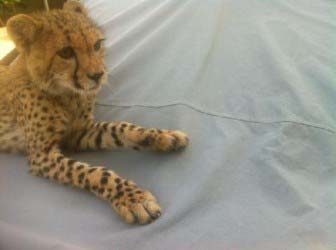
Authorities in Qatar and the Gulf should crack down on the illegal and potentially dangerous trend of keeping cheetahs as exotic pets, a new international conservation report has said.
In what has been billed as the most comprehensive study on the trade of cheetahs and other wild cats, the Convention on the Trade in Endangered Species (CITES) called on governments in Qatar and the GCC to step up action against the fashion of raising these big cats as household pets.
The cheetah is classified as “vulnerable” on the IUCN’s Red List of endangered species, and there are fewer than 10,000 of them world wide.
According to the Illegal Trade in Cheetahs report, most of these animals come from the Savannah in Africa, but there are also some 40-100 of the Critically Endangered Asiatic species left in Iran.
It is illegal to internationally trade in live cheetahs, under Article III of the CITES Convention, and Qatar and other GCC countries are signatories to that agreement.
However, for some years now cheetahs have been smuggled into the Gulf, mostly from the Horn of Africa – Somaliland, Ethiopia and Kenya, the report states.
Over the past several years, cheetah spottings in Qatar have not been uncommon. On Twitter and Facebook, residents have posted photos of cheetahs sitting in the passenger seats of SUVs, and even on speed boats.
A photo of a Qatari with a cheetah in his cruiser made @thechive … http://t.co/aUOvoy6T
— Khalifa Al Haroon – Mr. Q (@iloveqatar) November 7, 2012
And a few years ago, a cheetah was apparently openly sold through the online classifieds portal Qatar Living for QR35,000.

But public figures in Qatar have already voiced their opposition to the fashion.
In 2012, lawyer Mohsin Thiyab Al Suwaidi issued a warning that keeping wild animals such as cheetahs as pets is illegal and the owners face still penalties.
And Ayesha Almazroui, a columnist for Emirati newspaper The National, has also previously criticized the practice, saying:
“The question is not just how many of these pets are legal, it is also why having such animals can be permitted, despite all the potentially negative consequences for both the animals and their owners.”
$10,000 a cheetah
This report was compiled by Kristen Nowell of the International Union for Conservation of Nature (IUCN), an organization recognized as one of the world’s leading authorities on the conservation status of species.
It found that trade in cheetahs can be brisk, with some going for more than $10,000 each – a high price due to the fact that many of the cats die en route to their destination.
Relative to other big cats, cheetahs can be tamed fairly easily, especially if they are caught when they are young cubs.
While their new owners think they are looking after their pets well, the report said that many captive cheetahs die much earlier than they would have while living in the wild:
“It is clear that many owners treasure them and aspire to the best of care (even purchasing treadmills to keep them fit).
However, generally survivorship of cheetahs kept in inappropriate conditions is low, according to forensic examinations and the experience of several veterinarians.”
The report goes on to warn that some pets manage to escape and, despite being tamed, can still threaten the safety of their owners and neighbors. It added:
“The keeping of big cats in residential areas across the Arabian Peninsula poses serious environmental and safety risks, both to people as well as the cats.”
While the CITES study notes that some cheetahs may have been bred in captivity, it notes that the success rates of captive-bred cubs in the GCC region is low and the likelihood is that most cheetah pets were procured illegally.
CITES does concede that many cheetah owners do not realize that what they are doing is illegal and that there needs to be more public awareness of the issue, perhaps enlisting religious leaders to help spread the message among communities in Qatar and the wider region.
Crackdown on trade
The report calls on GCC governments to crack down on the illicit trade of cheetahs, and to ensure that national policies enforce the implementation of the CITES convention.
It continued:
“The Gulf states, as the prime destination for illegal wild cheetahs, need to significantly step up enforcement efforts at the borders and internally.
These countries should financially and technically support East Africa to combat illegal trade in cheetahs and enhance in situ conservation efforts.”
It also called on GCC governments to submit a report detailing their existing and planned laws and controls concerning cheetahs in captivity, and how these laws are being enforced.
Mandatory registration and individual identification markings for such animals could be one option of tracking the number of cheetahs and other big cats, the report stated.
The findings of the document are to be considered by CITES Animals and Standing Committees, with the latter making recommendations concerning trade in cheetahs for consideration at the 17th meeting of the Conference of the Parties in 2016.
Here’s the full report:
Thoughts?







